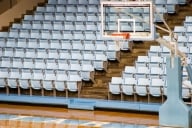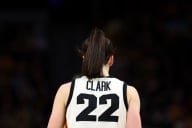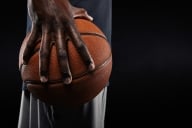You have /5 articles left.
Sign up for a free account or log in.
The National Collegiate Athletic Association and its Division I conferences have become the most recent focal point of the movement against racial injustice at American colleges and universities. A growing chorus of Black athletes has in recent days leveled charges that the college sports system is exploiting their talent and labor during the coronavirus pandemic.
The pandemic has disproportionately damaged the physical health and economic well-being of people of color, and it has infected many college athletes across the country as they return to campuses ahead of other students to prepare for the fall sports season. These issues are weighing on the consciousness of athletes who say their institutions are treating them as second-class students for entertainment purposes and to raise revenue. As a result, the athletes have started to organize in ways scholars say is unseen in the history of college sports.
This week, athletes in the Pac-12, a “Power Five” Division I conference that encompasses universities in the Pacific Northwest and Western parts of the country, began the first “coordinated” and “systematic” approach to college athlete activism seen in recent years, said Yannick Kluch, lead faculty consultant at the Center for Sports Communication and Social Impact at Rowan University.
A coalition of football players, one from nearly every institution in the conference, who say they represent hundreds of others, are threatening to sit out upcoming football practices and possibly games during the fall season if their health and safety concerns about playing are not properly addressed. The players’ preparation for a Sept. 26 start to the season, in which teams will only play opponents from within the conference, was scheduled to begin as early as Monday, according to a release from the Pac-12.
“We are being asked to play college sports in a pandemic in a system without enforced health and safety standards, and without transparency about COVID cases on our teams, the risks to ourselves, our families, and our communities,” said a letter and list of demands from the athletes, published on Aug. 2 under the name #WeAreUnited in The Players’ Tribune, a media company that publishes content by professional and college athletes.
Sam Owusu, a student research analyst for the College Crisis Initiative, a project at Davidson College in North Carolina that is analyzing colleges’ responses to the pandemic, described a “huge discrepancy” in how the reopening plans of Pac-12 institutions treat athletes compared to the general student body. Owusu, whose research has been focused on the conference, said most of the colleges are pursuing “primarily online” plans for the fall with some courses offered in person.
“That signals to the student body that they want to keep them safe from the virus, but for athletes, they started training camp yesterday,” Owusu said. “To many athletes across the Pac-12 and collegiate sports, with these moves to shorten the season or maintain some form of the season while the conscious decision by some schools is to move classes remote, it doesn’t seem like their health and safety is being prioritized.”
According to the initiative’s research, some Pac-12 institutions, such as the University of Colorado at Boulder and the University of Arizona, have already reported positive COVID-19 cases among football players. Chris Hostler, a physician epidemiologist and assistant professor of medicine at Duke University School of Medicine in North Carolina, said in a statement that “given current circumstances nationally, we should expect that there will be cases” within intercollegiate athletic conferences. This point was reportedly echoed by an official in the Southeastern Conference last week, who expects an outbreak on “every single team” in the conference.
“Any league should approach the upcoming season with the understanding that there is no zero-risk scenario for COVID-19 infections,” said Hostler, who is a partner with Infection Control Education for Major Sports, a company that is providing infection control consulting to sports entities, including some college conferences. “Conference-only schedules may provide more unified mitigation standards and practices, but again that will not completely eliminate the risk of infections.”
Some players believe these risks are too high to participate in the upcoming season.
Trevon Clark, a football player at the University of California, Berkeley, tweeted in support of #WeAreUnited and said he needs to stay healthy for the sake of his family.
“I got a son and fiancée that I come home to every day,” Clark wrote. “I’ll continue to protect them. It’s bigger than just football.”
Pac-12 commissioner Larry Scott said in a response letter to the #WeAreUnited group that there would be no repercussions for athletes who choose to sit out the season. He noted that this policy was announced on July 10.
"The Pac-12 has made clear that any student-athlete who chooses not to return to competition for health or safety reasons will have their scholarship protected and will remain in good standing with their team," he wrote. A spokesperson for the Pac-12 said in an email that the conference would not comment beyond Scott’s letter.
Scott's written assurances may not be enough to convince Kassidy Woods, a football player for Washington State University, that players who sit out won't be punished.
Woods said when he told the team’s head coach that he would sit out the fall season due to health concerns, the coach, Nick Rolovich, asked Woods if he was involved in #WeAreUnited and suggested participation in the group could affect his standing with the team, ESPN reported. Woods has the trait for sickle cell anemia, a blood disorder, and is concerned it puts him at increased risk of falling ill with the coronavirus. He also stated his support for the Pac-12 athlete group.
Rolovich said in an emailed statement that he spoke with Woods about his opting out before #WeAreUnited released its concerns. The statement said Rolovich regrets that “my words cautioning Kassidy have become construed as opposition.”
“I’m proud of our players and all the Pac-12 student-athletes for using their platform, especially for matters they are passionate about,” the statement said.
The risk of COVID-19 is just the tip of the iceberg for the #WeAreUnited athlete group. They detailed several conditions for players’ participation in the 2020 football season, including the right to profit from the use of their name, image and likeness; revenue distribution from the conference; and funds set aside to assist low-income Black students.
The majority of the players in the most profitable college sports, football and men’s basketball, are Black, and they are disproportionally harmed by NCAA policies, #WeAreUnited's letter in The Players’ Tribune said.
“In rejecting the NCAA’s claim that #BlackLivesMatter while also systematically exploiting Black athletes nationwide, #WeAreUnited,” the letter said.
Ellen Staurowsky, a sport management professor at Drexel University and expert on social justice issues in college sports, said discussions about COVID-19, racial injustice and the country's current political climate have highlighted “long-standing injustices,” such as denying athletes the opportunity to profit from their talent even as their institutions reap revenues from game broadcasts and sponsored advertising. The Pac-12 athletes are connecting the dots and identifying a system that has “built its business on the exploitation of athletes,” she said.
“We know that in terms of Black ownership relative to homes, retirement savings, access to health care, the full array of things that allow for upward mobility and for financial security … African Americans and people of color in the U.S. have not had the same access to any of that,” Staurowsky said. “So when an athlete is denied their value in the college sport system at the height of their earning potential, that has long-term consequences for their lives.”
Staurowsky and Ramogi Huma, executive director of the National College Players Association, which advocates on behalf of athletes, published a study report on July 31 about the opportunities for wealth that Division I athletes are prohibited from pursuing due to the NCAA’s rules against paying players. The study found that during the 2018-19 academic school year, the average football and men’s basketball player at a college in the Football Bowl Subdivision, the top division for football, had a fair market value of $208,208 and $370,085, respectively.
“After accounting for the value of college athletes’ athletic scholarships between 2017-2020, approximately $10 billion in generational wealth will have been transferred from college football and men’s basketball players, the majority of whom are athletes of color, to coaches, athletics administrators, and college administrators who are predominantly White or to institutions and programs that serve majority White constituencies,” the report said.
Elijah Molden, who is on the University of Washington football team, said in a tweet that he supported the sentiment of #WeAreUnited, but he noted that perhaps the demands that addressed athlete pay were too far-reaching. But Kluch, at Rowan, who has studied the activism of NCAA athletes and worked for the association’s Office of Inclusion, believes now is the right time to push for institutional changes to resolve injustices that the players say have long existed in college sports.
“We’re at a moment when we have the attention of the powers that be at the conference and institutional levels,” Kluch said of the athletes. “Why not ask now when you have that power and collective voice … Is it the right time? I think it’s always the right time to ask for society to be more just and equitable.”
Staurowsky added that the players’ organizing is “as brave a move as any of us can imagine” considering the lack of a college athlete association or existing infrastructure for players to coordinate demands and negotiate.
“This is completely and 100 percent organized solely by athletes on their own,” Staurowsky said. “To have to do this and organize each other, it is a powerful moment. They should be recognized for the tremendous conviction and courage they’re showing right now.”








